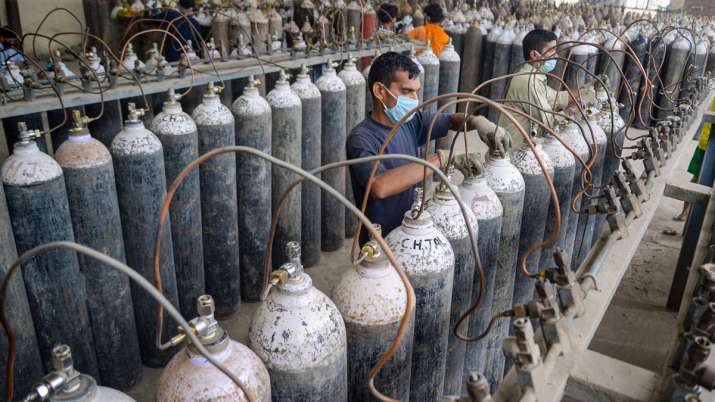
How SC, high courts keep governments on their toes in COVID fight
On the worsening COVID situation across the country, various high courts have heard petitions over availability of essential supplies, including drugs and oxygen and have passed orders with regard to imposing lockdowns and restrictions.

On the worsening COVID situation across the country, various high courts have heard petitions over availability of essential supplies, including drugs and oxygen and have passed orders with regard to imposing lockdowns and restrictions.
On the other hand, the Supreme Court on Thursday (April 22) on its own took up some key issues related to COVID management and noted that the matter was being heard in several high courts, “creating some confusion” and “diversion of resources.”
“We see that six High Courts are taking action. We appreciate that. But this is creating some confusion and diversion… We want to point out four issues — supply of oxygen, supply of essential drugs, method and manner of vaccination, declaration of lockdown. We will issue notice for a national plan on these issues,” the three-judge Bench, also comprising CJI Bobde, Justices L Nageswara Rao and S Ravindra Bhat, said.
Also read: PM sir, please make calls, let oxygen come from WB, Odisha: Kejriwal
The bench observed orally that the Supreme Court may withdraw to itself some issues from the high courts, while noting in its order that, “drugs, oxygen and vaccination availability and distribution are being carried out by government including the Central government according to protocols established by the health authorities.”
The Bench also observed that it is of the view that the power to declare lockdowns rests with the state and “this should not be by judicial decision”.
Here’s what various HCs have said:
* Uttar Pradesh: Earlier this week, the Allahabad High Court had directed the UP government to impose lockdown in five worst-hit districts — Allahabad, Lucknow, Varanasi, Kanpur Nagar and Gorakhpur. The Supreme Court had stayed the order after the state approached it. The high court had directed the state government to impose strict restrictions including the closing of malls, shopping complexes and restaurants till April 26 in the five districts, but stopped short of calling it a “complete lockdown”.
SC observation: The SC bench said its directive was not meant to stop high courts from entertaining matters related to the pandemic. “You may go ahead and present your plan (to high courts). It is not to supersede any (high court) order as of now,” Justice Bhat told Solicitor General Tushar Mehta, who wanted to know how the Centre should proceed with the matters pending before the high courts given that the Supreme Court was taking cognizance.
Also read: Indian middle class and poor hit hardest by global pandemic
* Gujarat: The High Court on April 20 told the state government that despite its claims on the availability of beds, COVID patients continued to face a shortage in cities like Ahmedabad. The Bench of Chief Justice Vikram Nath and Justice Bhargav Karia, during a hearing of the suo motu petition on the COVID-19 pandemic crisis in the state, sought to know why, if beds were vacant, infected persons were unable to get admitted to hospitals.
Senior advocate Percy Kavina, who was allowed to share the views of other High Court lawyers, expressed displeasure over the Centre’s decision to discontinue a scheme providing insurance cover to “corona warriors” under the Pradhan Mantri Garib Kalyan Yojana (PMGKP).
Kolkata: A division bench of Calcutta High Court on April 22 hit out at polling officials for not taking proper action to ensure COVID guidelines were followed during voting and campaigning by political parties in the state assembly election. Chief Justice TBN Radhakrishnan observed that the Election Commission of India has full power to implement COVID norms, but failed to do so. He said such inaction by the commission cannot be permitted and that action beyond issuing circulars needs to be taken by it.
“We are sure circulars are not merely advisories to be wrapped up by political parties or those involved in political propaganda or the public at large,” said the court.
Tamil Nadu: The Madras High Court on April 21 said the COVID situation in Tamil Nadu appeared to be serious, yet there was no lockdown and people weren’t following infection containment norms. It asked the government to bring in restrictions within two weeks since assembly elections were over. A day after elections on April 6, Tamil Nadu reported 3,986 new COVID cases.
Delhi: The Delhi High Court on Thursday (April 22) directed the Central government to create a separate corridor for transporting much-needed oxygen tankers for COVID patients and provide security cover to the supplies. The court said the Centre should ensure that Delhi receives its full 480 metric tonne quota of oxygen. It said non-compliance “will be seen very seriously as this is likely to result in grave loss of life.”
At the end of a three-day hearing where the Centre’s actions drew strong reprimand, the court ordered the release of Delhi’s full quota of oxygen. Criminal action will be taken against anyone stopping tankers or obstructing the movement of oxygen, the judges said. The High Court made it clear that it would continue to hear the issue till the Supreme Court takes over.
Madhya Pradesh: The HC on Monday (April 19) directed the state to ensure continuous and regular supply of oxygen, the Remdesivir drug and other facilities required for treatment of coronavirus. The bench of Chief Justice Mohammad Rafiq and Justice Atul Sreedharan heard five petitions against the alleged failure of the state government in dealing with the pandemic situation. In its 49-page order, the court noted that the health infrastructure situation in the state was not up to the mark. It took cognizance of media reports on shortage of hospital beds, Remdesivir and oxygen in major cities including Bhopal, Gwalior, Indore and Jabalpur.

